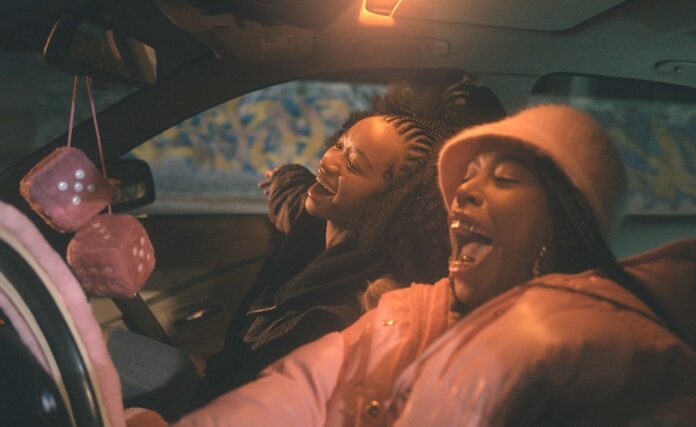When it comes to films made in San Francisco, there are no shortage of classics: Vertigo, Escape from Alcatraz, Mrs. Doubtfire, Bullitt, Dirty Harry—and the list goes on indefinitely. In many of those films, the city itself becomes a main character: its famously steep inclines, the sweeping waterfront views, Victorian homes romantically huddled along the hills, and of course, the iconic Golden Gate Bridge.
But in many cases, its actual people are left out—or even worse, the locals are flattened into a monolithic stereotype that rarely, if ever, represents the true spirit of intergenerational, working, and middle class San Franciscans. Even less likely is that these films focus on San Francisco’s diverse, marginalized communities of color with a genuine, holistic lens.
Sometimes, it takes a real San Franciscan to tell it how it is.
Maya Cameron-Gordon is one such griot—part community advocate, part documentarian, part creative entrepreneur. And she’s Frisco to the core. Having previously taught mindfulness to young students, she was born in the 415, and has invested in her city (and the Bay Area as a whole) as a business owner and children’s book author. Her national breakout debut The Mermaid Princesses is a tale meant to empower young Black and Brown girls to see themselves as protagonists in a fantastical mermaid adventure.
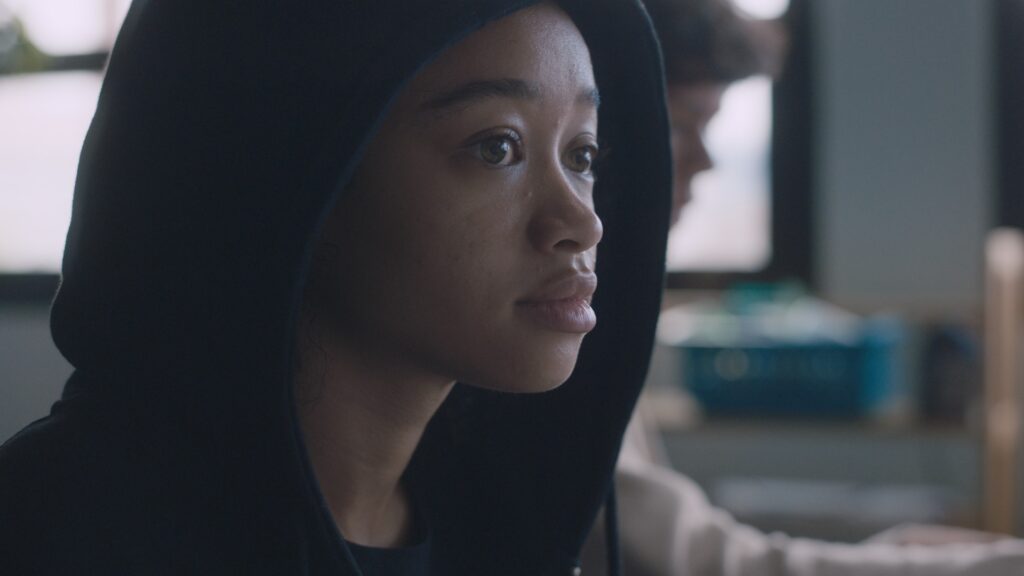
Now, Cameron-Gordon is set to make her silver screen premiere as the writer and director of What’chu Mixed With?, a short film based in her hometown, featuring a cast of San Franciscans. The Bay Area bildungsroman focuses on a young biracial woman learning how to navigate the world and her identity without her father, as she is taken under the wing of an older girl from Hunters Point. Set in the early 2000s, it stars Jasmin Corley and Mariah Fields (also known as the rapper Alien Mac Kitty, whose late father, Cougnut of I.M.P, is considered a San Francisco rap legend).
The film will be screening at 6pm on Wed/11 at Oakland’s historic Grand Lake Theater during Bay Area Film Night. It will be premiering alongside Jamal Trulove’s I Thought You’d Never Ask. Just in time for opening night, Cameron-Gordon checked in with 48 Hills about the film, her creative process, and the importance of being a San Franciscan storyteller.
48 HILLS When and where did you grow up in San Francisco?
MAYA CAMERON-GORDON I grew up all over the city, but lived the longest in the Western Addition (Fillmoe) and the Mission. I was a teenager in the early 2000s, and I feel a strong need to create films from that era because it was so rich in culture—everything from the music to the style was unique, something you couldn’t find anywhere else in the country.
My teen years and early twenties were wild. I started getting into trouble around 13 and ended up caught in a cycle of juvenile hall and group homes across the Bay Area. By the time I was in my early twenties, I felt like I had already lived so many lives. I’ve had so many experiences and crossed paths with so many people—some of whom inspired characters in my stories and sadly aren’t here anymore. Telling these stories is my way of keeping their memory alive.
48 HILLS How did those experiences influence your desire to share Bay Area stories, especially those that are undertold, through film and beyond?
MAYA CAMERON-GORDON Film changed the trajectory of my life. I stumbled into my first film class in my early twenties, and later went on to earn my MFA in filmmaking. That’s when I really noticed how drawn I was to autobiographical work. For me, film is therapeutic—it helps me process and make sense of everything I’ve been through.
The themes I’m most drawn to are transformation and breaking cycles of intergenerational trauma. But at the heart of it all, I just have a deep desire to tell stories about the city that shaped me.
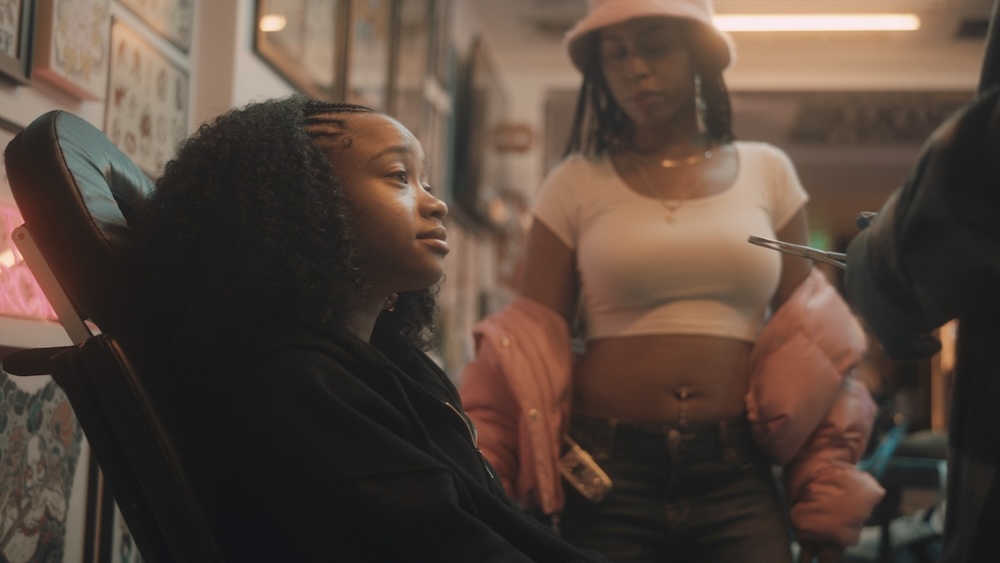
48 HILLS Take us into your film. What were you exploring and hoping to uncover for yourself?
MAYA CAMERON-GORDON This film is deeply inspired by my own experiences growing up mixed in San Francisco, and the major transformation I went through around the age of 13. At the time, my dad got sick with hepatitis C and my grandma passed away. After that, [my dad] moved back to where he was from—South Central L.A. That was a really tough time for me. I was close to him, and his absence shook a big part of my identity.
Even though I lived in a Black neighborhood, I was attending a mostly white middle school, and I didn’t feel like I fit in anywhere. One of the things I struggled with most was my hair—I had this big, frizzy hair I didn’t know how to manage, and I didn’t dress as fly as some of the other kids in my community. I just felt different.
At the time, my mom was working at a school in Hunters Point, and one of her favorite students was a popular 17-year-old named Precious. One day, she came over to our house to straighten my hair, and from that moment on, she took me under her wing. She gave me her hand-me-downs and my first pair of Jordans. She offered me mentorship, friendship, and laced me with some game. At 13, she introduced me to a whole new world—a different side of Frisco I had never seen before.
That experience changed the course of my life. In some ways, it helped me grow. In other ways, it pulled me into things I wasn’t quite ready for. But it shaped who I am, and I’ll always be grateful for it. At its core, this film is about identity—especially the complexity of being mixed. But it’s also about transformation. That universal shift we all go through during adolescence, moving from childhood into young adulthood.
48 HILLS Who are some of the creatives who have inspired your craft as a first-time director?
MAYA CAMERON-GORDON I’m extremely inspired by the work of Ava DuVernay. What I love most about her is her range—the versatility of her projects and the fact that she creates whatever moves her. She’s made everything from A Wrinkle in Time, a fantasy film for kids with meaningful representation, to 13th, a powerful documentary about the mass incarceration of Black men, to historical dramas. Each of her films is so beautifully crafted and filled with heart. What inspires me most is that her work doesn’t fit into a single box—and that’s the kind of career I hope to have. I want to tell stories across genres, from children’s films to documentaries. I also grew up on Spike Lee and Quentin Tarantino. Some of my favorite films growing up were Crooklyn, Do the Right Thing, Kill Bill, and Jackie Brown. I’ve always loved films that break the rules but do it with style and purpose.
I also admire F. Gary Gray, who directed Set It Off and Friday. His films feel raw and authentic—they capture the heart of South Central in a way that resonates even with people who haven’t lived it. That’s exactly what we need more of in the Bay: directors who truly understand the culture and can bring it to life on screen. We have such a unique culture here—so much untapped talent and powerful stories. That’s why some of the films that have inspired me the most were made right here in the Bay—movies like Blindspotting and La Mission. I remember sitting in the theater watching them, covered in goosebumps. Seeing the Bay represented on the big screen was surreal. It felt like confirmation that this was the right path for me—that this is exactly what I’m meant to be doing.
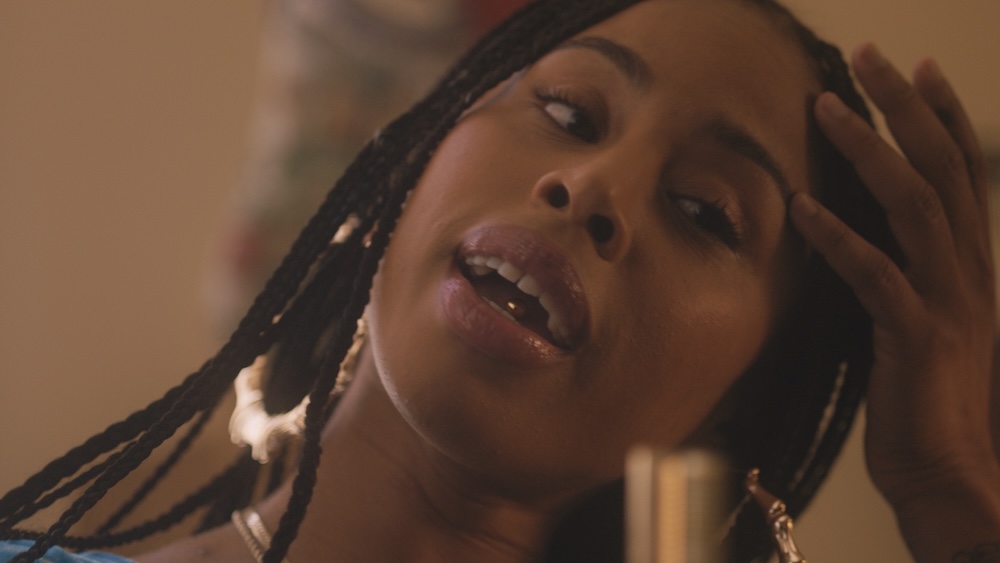
48 HILLS What were some of the challenges in filming What’chu Mixed With?? What lessons did you gain from the process?
MAYA CAMERON-GORDON Most of my biggest challenges were the typical ones that come with being a first-time director. I truly believe your first project is often the hardest because you have to push through imposter syndrome. I was leading a team of professionals who had probably been on more sets in the last month than I had in my entire life. That was intimidating—but at the end of the day, you have to trust yourself and your vision. I learned how crucial it is to trust your instincts as a director. It’s important to stay open, humble, and receptive to your crew’s input—they bring so much value—but you also have to trust your gut. Finding that balance between collaboration and confidence in your own voice is key. Raising money for the project was another major challenge and a huge source of stress. One of the biggest lessons I learned is that fundraising shouldn’t happen during pre-production—those funds need to be secured well in advance.
48 HILLS San Francisco has a rich cultural history that isn’t always showcased on a national level lately. There has been a lot of focus on the negativity, like business closures and crime, in recent years. What would you tell those who think San Francisco has lost its magnetism and magic?
MAYA CAMERON-GORDON I can’t lie—sometimes I feel the same way. However, I think we lost some of the magic and magnetism when so many people from the city were forced to move.
To the people saying San Francisco lost its magic, I’d say: invest in it. Support our artists, support our small businesses. Complaining about the problem—which I’m definitely guilty of sometimes—doesn’t fix it. We have to advocate for and protect the programs that are working to keep people from the city in the city. We need to show up for each other, stay involved in what’s happening politically, and not let other people make decisions for us.
That said, I know how hard it is when you’re just trying to make it. My husband and I had to move out of the city when our daughter was two because we needed something more affordable. Thankfully, we found a place not too far away in Oakland. But sometimes it’s hard coming back to San Francisco and seeing how different it is from the city I grew up in. So many families and communities have been ripped apart. You roll up to certain neighborhoods and don’t see those familiar faces anymore because so many people had to leave.
I do appreciate that there’ve been some efforts to support Black, Brown, and native SF-owned businesses, and to help folks from here buy property. But we need more of that. We need real investment in the people who made this city what it is.
48 HILLS What are you hoping audiences might take away from watching this short film?
MAYA CAMERON-GORDON I think it’s a very human story—one that people will connect with whether they’re biracial or not. For those who were in San Francisco during the early 2000s, I hope it brings a sense of nostalgia. And for others, I hope it offers a window into the culture and energy of that time. More than anything, I want this film to spark conversations around identity and offer some insight into the unique struggles biracial people can face—so that families, especially, can better understand how to support them. And for those who’ve had similar experiences, I want them to feel seen, understood, and validated.
48 HILLS You’re a mom, a business owner, an author, and now a director and screenwriter. How do those mediums and roles inform one another, and what’s next for you?
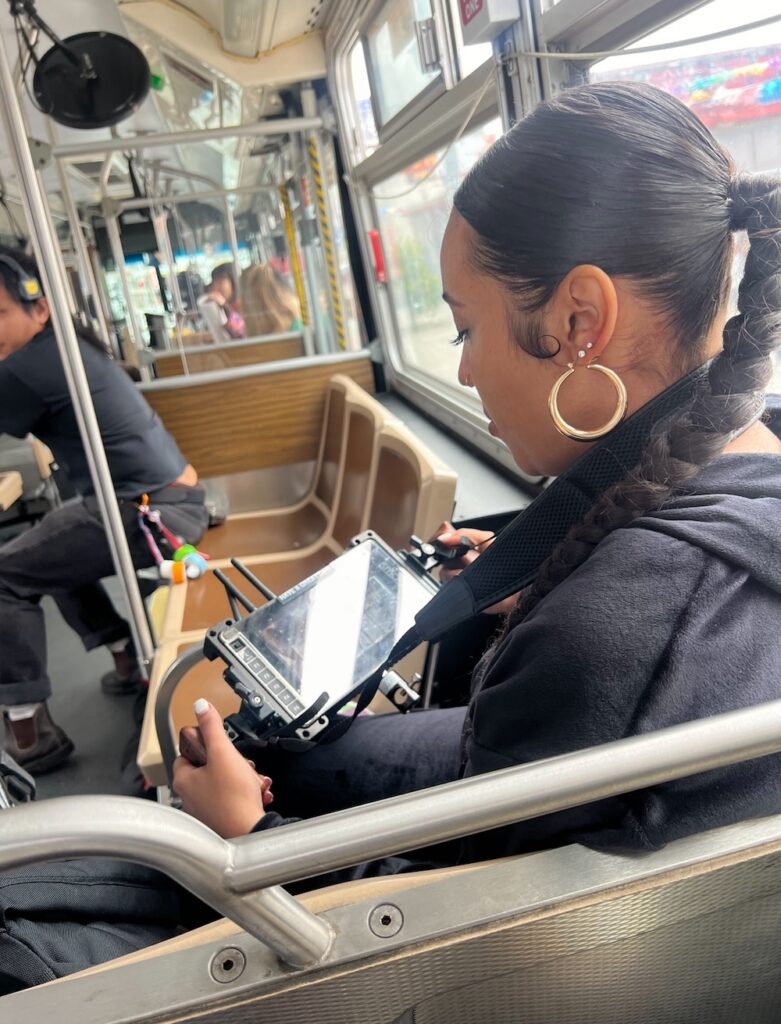
MAYA CAMERON-GORDON My experience with my businesses—especially Bougie Smoothie, my smoothie shop—really helped prepare me for my role as a director and producer. Running a business taught me how to lead teams, plan ahead, create systems, and work hard, and all of those skills translated directly into the filmmaking process. It also gave me the confidence I needed to walk onto set and lead with clarity and purpose.
Ultimately, I made the difficult decision to close Bougie Smoothie in Emeryville so I could fully immerse myself in filmmaking. During my MFA program, I realized that both filmmaking and running a business demand your full attention—there’s no halfway. I had to choose my dream.
I really believe that in order to be successful at anything, you have to go all in and let go of your plan B. That’s what I did. And now, I’m starting to see just how much crossover there is between being a mom, an entrepreneur, an author, and a filmmaker. There are some core skills—like discipline, vision, and resilience—that show up in all of it.
48 HILLS What’s next?
MAYA CAMERON-GORDON The whole point of making a short film was to gain the skills and experience I’d need to direct a feature. Right now, I’m deciding whether to make one more short before jumping into the feature film I wrote during my MFA program. What’chu Mixed With? serves as a proof-of-concept for that larger story, so I’m using it to build momentum and interest. After that, I’m excited to shift gears and dive into children’s films and television. I’m preparing to pitch an animated series adapted from my children’s book The Mermaid Princesses, which was published by HarperCollins. I’ve always been drawn to fantasy, and one of my biggest dreams is to create magical stories where kids—especially kids of color—can see themselves reflected on screen.
WHAT’CHU MIXED WITH? screens Wed/11. Grand Lake Theater, Oakland. Tickets and more info here.


